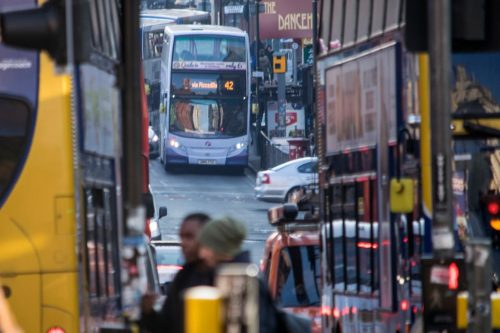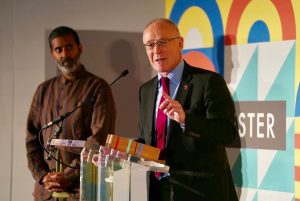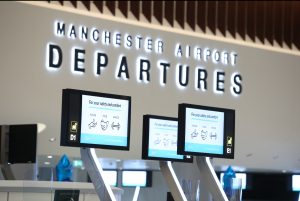Further consultation on shake-up of Greater Manchester bus services

Greater Manchester will hold a further consultation on its proposals to reform the bus market following work to understand the potential impact of COVID-19.
At a meeting next Friday, November 27, Greater Manchester Combined Authority (GMCA) will be asked to give the go-ahead to a consultation on the potential impacts of COVID-19 on both Greater Manchester’s bus market and its proposed franchising scheme.
This follows an earlier consultation, held between October 2019 and January 2020, on the introduction of the proposed franchising scheme.
A final decision on the scheme was planned for Spring 2020, but this was delayed due to the impact of COVID-19.
Reform of the bus market is a key part of ‘Our Network’, Greater Manchester’s 10-year plan for a world-class, integrated public transport network, that makes getting around the city region easy, accessible and affordable.
Our Network is part of the Transport Strategy 2040, the city region’s long-term plan for transport with the right connections in the right places, simple ticketing across different types of transport and the potential to transform Greater Manchester, by enabling people to move around quickly and easily.
Buses are a vital part of Greater Manchester’s public transport system and throughout the COVID-19 pandemic they have become even more essential – 75% of public transport journeys made in Greater Manchester, both before and during the pandemic, are by bus and they continue to be a critical link to jobs and essential services.
Currently in Greater Manchester the bus companies decide the routes, frequencies, fares and standards. The GMCA says there is no coordination and limited oversight. Where bus companies decide not to run services, where necessary the public sector pays to fill in the gaps.
Under franchising, bus services would be brought under local control. GMCA would coordinate the bus network based on the services passengers need and would also coordinate investment in the bus market. The bus operators would be contracted by GMCA to run the services.
More than 8,500 individuals and organisations from across Greater Manchester and beyond responded to the previous consultation, with eight-out-of-10 respondents, who answered the relevant question, supporting the proposed franchising scheme.
Before COVID-19, bus usage was already falling in Greater Manchester, which was one of the reasons why GMCA was considering the proposed franchising scheme.
The pandemic has had a significant impact on bus usage, with passenger levels dropping by around 50%. However, bus patronage did recover more quickly than other modes of transport during the pandemic, demonstrating how vital bus services are to those who rely on buses to access work, especially the 30% of households who do not have a car.
If bus usage remains low and nothing is done to reform the bus market, services may be further reduced, which may mean the public sector will need to provide more funding to keep essential services running, especially for Greater Manchester’s poorest and most vulnerable who depend on the bus network. This would mean the public sector paying more proportionally towards the bus network while still having no control and limited oversight.
Fewer bus services could also lead to more people driving, increasing congestion and pollution and hampering economic growth.
The COVID Impact Report carried out by TFGM, confirmed that despite the impact of COVID-19, GMCA would still be best placed to plan and coordinate the city-region’s bus network to meet passengers’ needs and the proposed franchising scheme is still the best way to achieve Greater Manchester’s long-term ambition for an integrated public transport network.
Under franchising, bus services would be brought under local control and GMCA would coordinate the bus network based on the services passengers need and would also coordinate investment in the bus market.
However, the proposed franchising scheme would mean more of the financial responsibility and risk would belong to GMCA and the public sector.
The potential longer-term impact of COVID-19 on bus usage may also mean GMCA is faced with difficult choices about the network to manage this financial risk and this may impact on the revenue GMCA would receive under franchising.
Overall, the report found that the proposed franchising scheme would still be affordable and still represent value for money.
If approved by GMCA, the consultation will be on the conclusions of the COVID-19 Impact Report and whether the proposed franchising scheme should change. It would take place between Wednesday, December 2, 2020 and Friday, January 29, 2021.
Deputy Mayor, Sir Richard Leese, said: “Throughout this pandemic, buses have proven themselves to be a critical lifeline for people who have needed to get to work, to help other people or to access essential services.
“But before COVID-19, bus usage was already falling in Greater Manchester, and the pandemic has caused passenger levels to drop even further.
“If bus usage remains low and nothing is done to reform the market, services may be further reduced, which may mean the public sector will have to provide more funding to keep essential services running, especially for Greater Manchester’s poorest and most vulnerable who depend on them – but we currently have no control and limited oversight over any changes to services.
“That is why, now more than ever, we need our buses to work for the people of Greater Manchester.
“The evidence suggests that the proposed franchising scheme is still the best way to achieve this and to deliver a joined-up public transport network with simple fares and ticketing and the improved customer experience that Greater Manchester’s passengers deserve. And it needs to proceed now so it can be an important part of our recovery from the pandemic.”

Sir Richard Leese
He added: “We want to ensure everyone in the city region and beyond has a chance to have their say on how COVID-19 has affected our proposals, so next week GMCA will decide whether to proceed with a further consultation.”
Responding to today’s announcement, bus operator Stagecoach suggested the introduction of ‘Recovery Partnerships’ to form the basis of new bus services.
Martin Griffiths, Stagecoach chief executive, said: “The pandemic has had a significant impact on all public transport networks across the country, regardless of how these systems are structured.
“The key lesson has been the positive impact from government, local authorities and public transport operators working in partnership to deliver the vital services that customers and communities need in very challenging circumstances.
“We believe there is a major opportunity to build on this strong collaboration to put in place new Recovery Partnerships to rebuild bus networks and attract passengers back.
“These would provide the framework, funding and flexibility to ensure bus networks coming out of the pandemic meet the changing needs of local communities, get people back to work, and maximise the power of buses to drive a green recovery.”
He added: “Our priority before and throughout the COVID-19 pandemic has been to provide safe, high-quality and accessible public transport built around the needs of local people.
“We will continue to work constructively with stakeholders in Greater Manchester and elsewhere to deliver the best and most sustainable bus networks for communities for the long-term.”
Recovery Partnerships would involve an agreement between bus operators and local transport authorities to work together to deliver a new post-COVID-19 bus network, including short and long-term measures to deliver a sustainable system to meet passenger priorities.
Under the proposal, which has been submitted by bus operators to the Department for Transport, Recovery Partnerships would be allocated ring-fenced funding focused on passenger improvements.
There would be clear goals, incentives and measures of success for all parties, as well as the flexibility for local solutions to take account of local circumstances.
These partnerships are designed to act as a bridge from the current interim arrangements to a longer-term commercially sustainable system.
Recovery Partnerships would have the power to deliver bus priority measures, targeted fares initiatives, funding to kick-start new services, and support for existing community links.
This is designed ensure bus services can drive a green recovery from the pandemic, support climate change and clean air targets, and help rebuild town and city centres.








